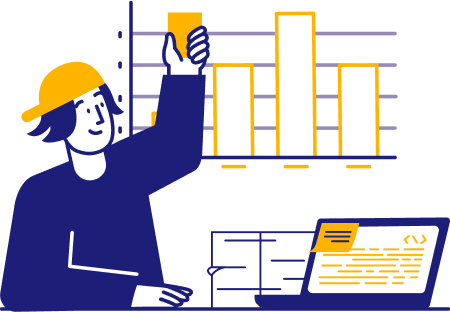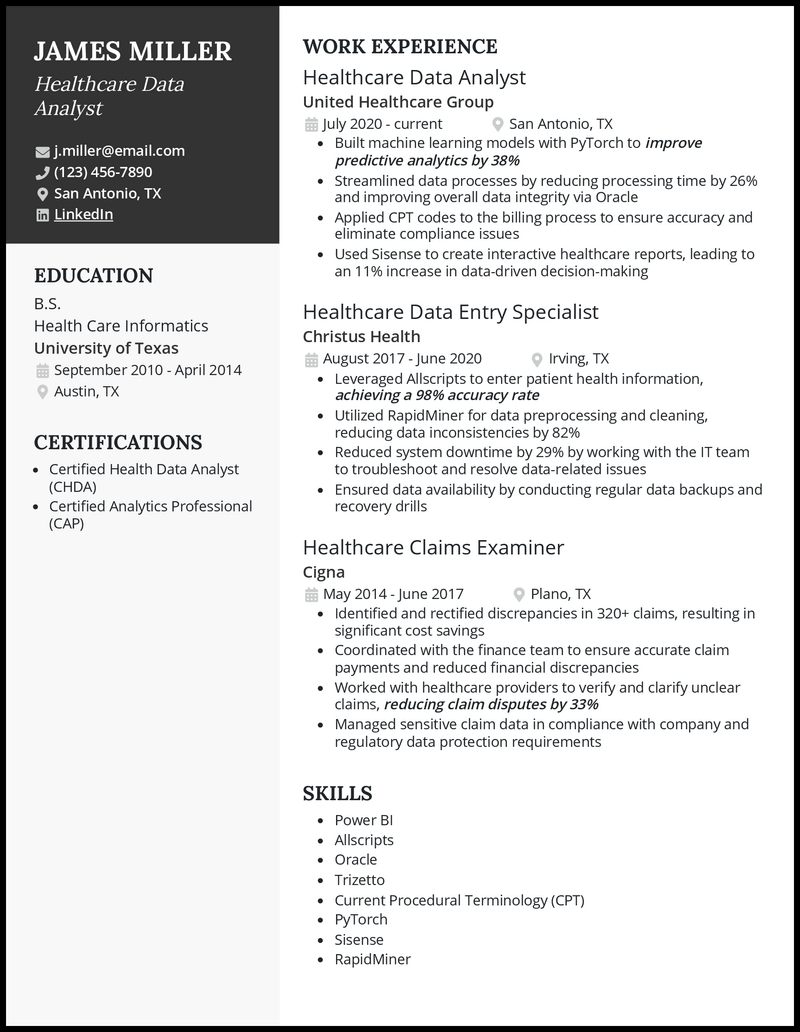You’re a pro at discerning patterns in complex healthcare data and analyzing your findings. Thanks to your keen eye for detail, you transform your analyses into actionable insights for better patient care.
From managing databases and EHRs to maintaining data integrity, you’re definitely the right person for the job. Now, you only need to build a resume online and write a cover letter that convey this to recruiters.
We’ve got you covered! Our healthcare data analyst resume examples and resume tips will guide you through creating a job application that gets you more interviews.
Related resume examples
What Matters Most: Your Healthcare Analysis Expertise & Work Background

With a thorough knowledge of healthcare data standards, and the ability to effortlessly visualize complex data sets with tools like Tableau and Power BI, your skill set ticks all the boxes for this role.
Aside from technical abilities, you’ve also got people skills to match, be it presenting or collaborating across many different departments. However, keep the focus in this section on your technical know-how, and let your soft skills shine through your work experience instead.
Prioritize listing your healthcare-specific skills and proficiencies first, such as your in-depth knowledge of HL7, followed by your more generalized expertise as a data analyst.
Make sure to get into the specifics of each tool, language, and analysis framework you’re well versed in—it’ll help you hit relevant keywords!
9 most popular healthcare data analyst skills
- HL7
- HIPAA Compliance
- SQL
- Tableau
- Python
- Power BI
- Sisense
- EHR Understanding
- Health Informatics
Sample healthcare data analyst work experience bullet points
Throughout your career as a data analyst, you’ve meticulously cleaned and extracted countless data sets using RapidMiner and SQL, created and presented data visualizations using Tableau, and built predictive healthcare models using Python.
Thanks to your work, numerous healthcare organizations have been able to affect meaningful changes motivated by data-driven insights.
To help recruiters visualize your impact, always back up your work experience bullet points with concrete metrics. Your experience designing a predictive algorithm using machine learning will stand out to a recruiter a lot more if you include how it improved patient outcome predictions by 15%.
Here are examples of how to do this in your resume:
- Streamlined EHR data extraction processes, resulting in a 23% decrease in data inconsistencies
- Developed and implemented a data visualization dashboard using Tableau, leading to a 42% increase in stakeholder engagement
- Utilized Python for predictive modeling, helping identify high-risk patients with 87% accuracy
- Leveraged automation scripts in R to reduce manual data-cleaning tasks by 50%
Top 5 Tips for Your Healthcare Data Analyst Resume
- Convey the scale of the data
- Rather than just mentioning that you’ve analyzed various healthcare data, be specific about its scale and impact. For instance, saying you analyzed over 3 million patient records to identify patterns in disease outbreaks gives a much clearer sense of the magnitude of your work.
- Showcase your software expertise
- When you discuss your experience using analytics tools like Sisense, don’t just say you’re proficient in it—take it a step further by talking about how you leveraged it to make an impact. Here’s an example: “Designed interactive reports with Sisense to track patient recovery metrics, improving care response times by 15%.”
- Put regulatory compliance first
- Your knowledge of the healthcare regulatory landscape is crucial. Highlight your familiarity with this aspect by citing the high compliance rates you’ve achieved through your work.
- Talk about efficiency
- Recruiters value the ability to automate processes and boost data extraction efficiency. Show them you have this skill by highlighting instances where you’ve used automation to your advantage. You could, for example, tell them that you used Python to design automated scripts to extract and clean data, leading to a 30% reduction in manual processing tasks.
- Show off your soft skills
- While your technical prowess should take center stage in your resume, your soft skills, such as communication, presentation, and critical thinking, are invaluable, too. Mention instances where you leveraged these skills, such as when you presented complex data findings to non-technical stakeholders, informing two new healthcare initiatives.
Absolutely. While they’re rarely required, certifications such as Certified Health Data Analyst (CHDA) can help signal to recruiters that you’re passionate about and committed to your niche within data analytics, and help set you apart from other candidates.
Unless you have more than 10 years of experience in healthcare analytics, your resume shouldn’t exceed a single page, so fit as much as you can. If you’re having trouble fitting in all your experience, include just your most relevant and recent work experience.
Emphasize your education and personal projects related to either healthcare or data analytics to show your knowledge of the field. In addition, you can lean into transferable skills from past jobs; for instance, if you’ve worked in tech support, talk about your ability to work in a team and explain complex concepts to non-technical users. Finally, leverage making a cover letter to highlight why you’re qualified for such a career switch.










